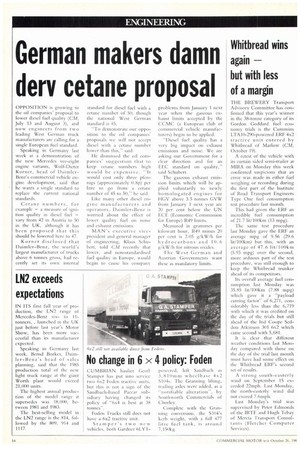German makers damn dery cetane proposal
Page 16

If you've noticed an error in this article please click here to report it so we can fix it.
OPPOSITION is growing to the oil companies' proposal to lower diesel fuel quality (CM, July .13 and August 3), and now engineers from two leading West German truck manufacturers are calling for a single European fuel standard.
Speaking in Germany last week at a demonstration of the new Mercedes we-eight engine variants, Wolf-Dieter Korner, head of DaimlerBenz's commercial vehicle engine development, said that he wants a single standard to replace the current national standards.
Cetane numbers, for example — a measure of ignition quality in diesel fuel — vary from 42 in Austria to 50 in the UK, although it has been proposed that this should he lowered here to 47.
K orn eldisclosed that Daimler-Benz, the world's • largest manufacturer of trucks above • 6 tonnes gross, had recently set its own internal standard for diesel fuel with a cetane number of 50, though the national West German standard is 45.
"To demonstrate our opposition to the oil companies' proposals we will not accept diesel with a cetane number lower than this,said.
He dismissed the oil companies' suggestion that to keep cetane numbers high would be expensive. "It would cost only three plen-• nigs (approximately 0.8p) per litre to go from a cetane number of 45 to 50,he said.
Like many other diesel engine manufacturers and operators. Daimler-Benz is worried about the effect of lower quality fuel on noise and exhaust emissions.
MAN's executive vicepresident and general manager of engineering, Klaus Schubert, told CM recently that lower, and non-standardised fuel quality in Europe, would begin to cause his company problems from January 1 next year when the gaseous exhaust limits accepted by the CCMC (a European club of commercial vehicle manufacturers) begin to be applied.
"Diesel fuel quality has a very big impact on exhaust emissions and noise. We arc asking our Government for a clear direction and for an EEC standard on quality," said Schubert.
The gaseous exhaust emission limits which will he applied voluntarily to newly homologated engines for HGV above 3.5 tonnes GVW from January I next year arc 20 per cent below the UN ECE (Economic Commission for Europe) R49 limits.
Measured in grammes per kilowatt hour, R49 minus 20 per cent is 2.05 g/kW/h for hydrocarbons and 10.6 g/kW/h for nitrous oxides.
The West German and Austrian Governments want these as mandatory limits.








































































































